PREVIOUS
SDG Goal wise programs of India – Part 06
November 22 , 2024
140 days
564
0
SDG Goal wise programs of India – Part 06
(இதன் தமிழ் வடிவத்திற்கு இங்கே சொடுக்கவும்)
Kisan Credit Card (KCC) Scheme
Launched:
- The Kisan Credit Card (KCC) Scheme was launched in 1998.
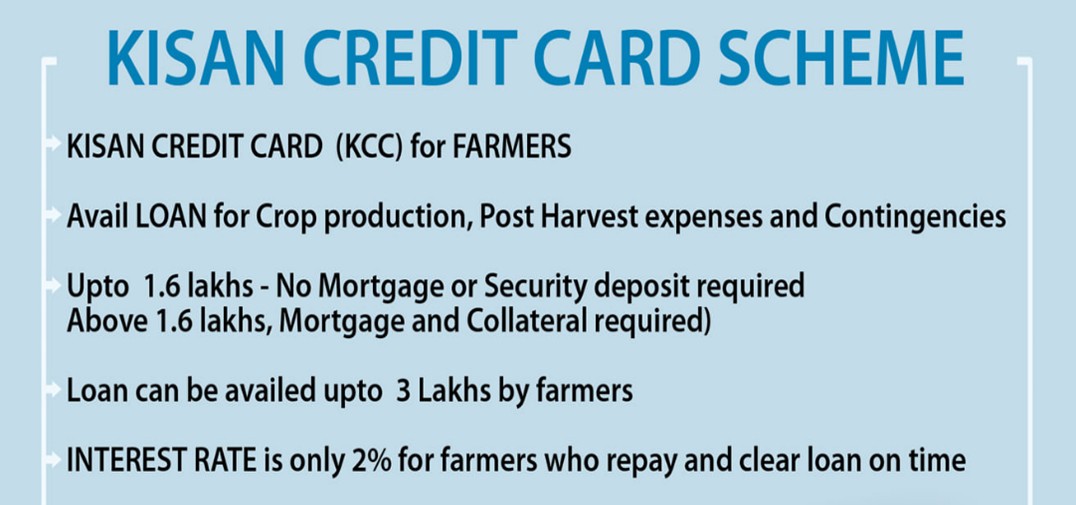
Ministry or Nodal Agency:
- Ministry of Finance, Government of India.
- Reserve Bank of India (RBI).
- National Bank for Agriculture and Rural Development (NABARD).
Objectives
- The primary objective of the Kisan Credit Card (KCC) Scheme is to provide financial support to farmers for their agricultural and allied activities.
- It aims to offer a simplified and affordable credit facility to meet the following needs:
- Crop production: To provide timely and sufficient funds for crop cultivation.
- Post-harvest expenses: To cover the costs incurred after the harvest, including marketing expenses.
- Consumption needs: To address the consumption needs of farmers and their families.
- Working capital: To ensure that farmers have sufficient working capital to sustain their agricultural activities throughout the year.
- Additionally, the scheme promotes financial inclusion by offering a formal credit channel to farmers who typically have limited access to traditional banking services.
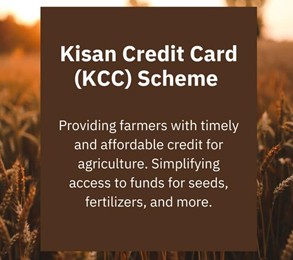
Beneficiaries
- Farmers engaged in agriculture-related activities such as crop cultivation, animal husbandry, fisheries, and other allied sectors.
- Individual farmers, joint borrowers, self-help groups, and tenant farmers are all eligible to apply for the KCC.
- The scheme also targets small and marginal farmers who often face difficulties accessing formal financial services.
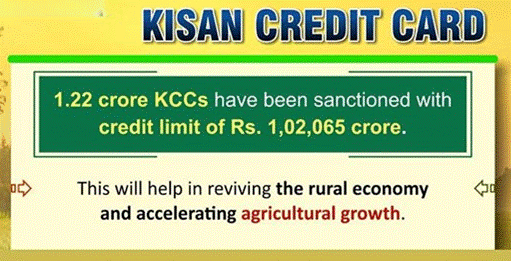
Eligibility Criteria
- Engaged in agriculture-related activities, including crop production, livestock farming, fishery, and other allied agricultural sectors.
- Individual farmers, joint borrowers, tenant farmers, and self-help groups can apply.
- The eligibility depends on the scale of finance, landholding size, and cropping pattern of the applicant.
- Farmers must also provide necessary documents, including land records, identity proof, and other relevant papers as specified by the financial institutions.
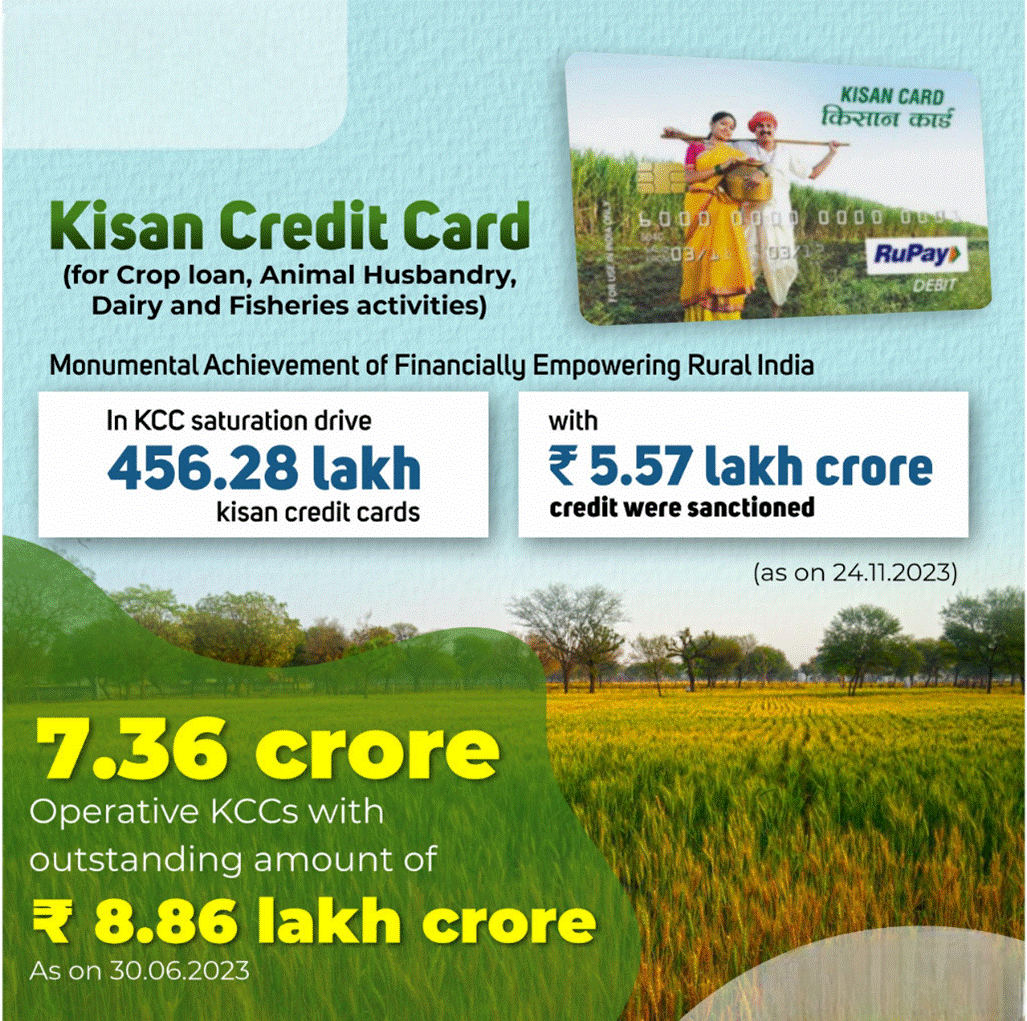
Benefits
- Revolving Credit Limit: A pre-sanctioned credit limit based on the scale of finance, cropping pattern, and cost of cultivation.
- This amount is flexible and can be accessed multiple times as required.
- Low-Interest Rates: The scheme provides access to credit at lower interest rates compared to traditional money lenders.
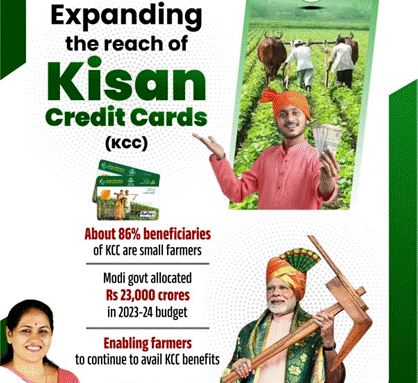
- Flexible Repayment Terms: Repayment can be done in installments or as a lump sum after the harvest, based on the income generated from the agricultural activity.
- Interest Subsidy: Farmers are eligible for an interest subsidy on the loan amount, reducing the burden of high-interest payments.
- The government determines the subsidy rate, which may change periodically.
- Insurance Coverage: The KCC provides insurance coverage for farmers against unforeseen circumstances such as crop failure, natural disasters, or death/disability of the farmer.
- Holistic Support: The card covers a variety of needs, including working capital, cultivation costs, marketing, and post-harvest requirements, ensuring support throughout the agricultural cycle.
Additional Information
- Implementation: The scheme is implemented by various financial institutions, including commercial banks, regional rural banks, and cooperative banks.
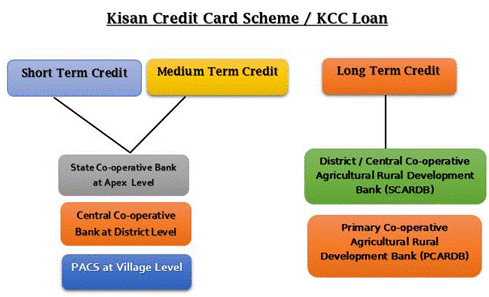
- Expansion: In 2004, the KCC was expanded to include investment credit for allied agricultural activities, such as fisheries, animal husbandry, and dairy farming.
Significance:
- The KCC scheme has simplified the credit delivery process for farmers, enabling easy and timely access to funds.
- It plays a key role in promoting financial inclusion among farmers, especially small and marginal farmers, who often struggle to access credit from traditional banks.
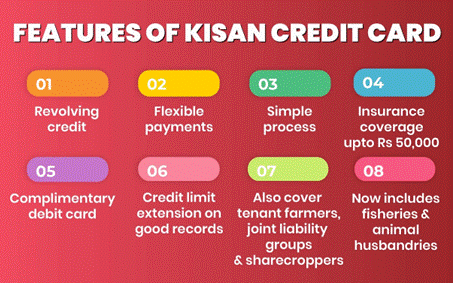
- By offering affordable credit, the scheme enables farmers to invest in modern agricultural practices, improve productivity, and increase their income.
- The scheme also helps reduce the financial risks associated with farming by providing insurance coverage against unexpected events.
Challenges
- Inadequate Credit Flow in Remote Areas: Farmers in rural and remote areas sometimes face difficulties accessing the scheme due to poor financial infrastructure and documentation issues.
- Documentation Hurdles: Some farmers find it difficult to provide the required documentation, such as land records and identity proofs, which may limit their access to the scheme.
Pradhan Mantri Kisan Sampada Yojana (PMKSY)
Launched:
- The Pradhan Mantri Kisan Sampada Yojana (PMKSY) was launched in 2017 by the Government of India.
- The scheme was originally conceived as the SAMPADA (Scheme for Agro-Marine Processing and Development of Agro-Processing Clusters) in 2016 and was later renamed.
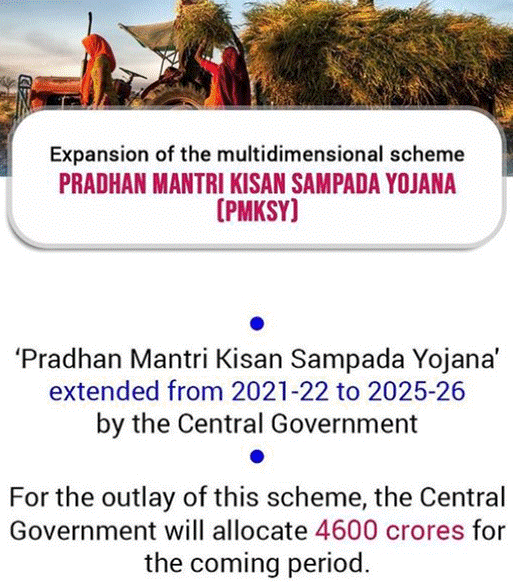
Ministry or Nodal Agency:
- Ministry of Food Processing Industries (MoFPI), Government of India.
- NABARD (National Bank for Agriculture and Rural Development) and other agencies assist in the implementation.
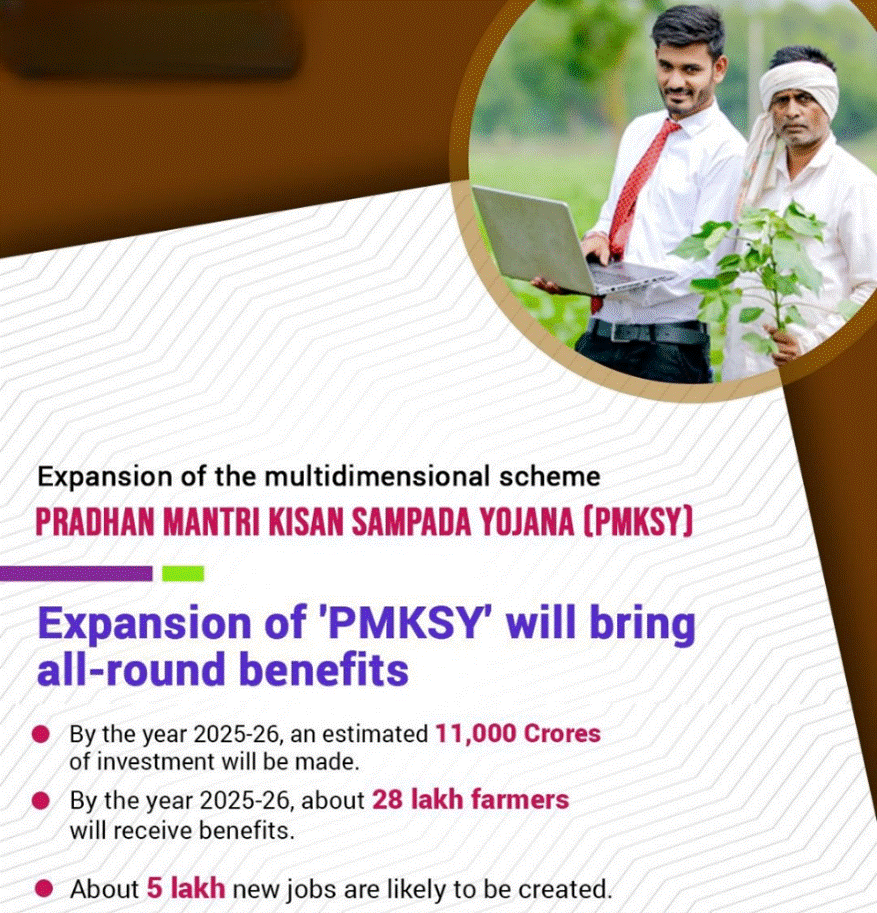
Objectives
- Develop Infrastructure: Create modern infrastructure for food processing, including cold chains, warehouses, and food processing units.
- Value Addition: Enhance the value addition of agricultural produce through food processing and agri-business.
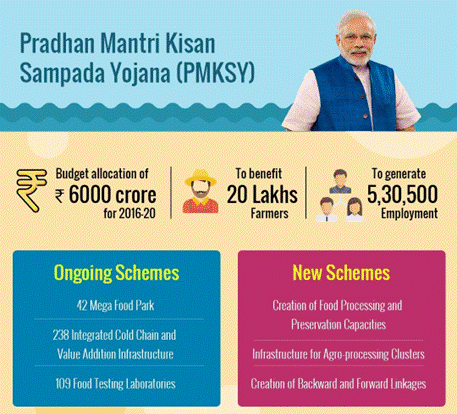
- Generate Employment: Create job opportunities, particularly in rural areas, by encouraging investment and entrepreneurship in food processing.
- Increase Farmers' Income: Improve income by reducing post-harvest losses, improving market access, and ensuring better price realization for farmers.
- Improve Food Safety and Quality: Ensure food safety, quality standards, and hygiene in the food processing sector.
- Efficient Supply Chains: Establish efficient supply chains that connect farmers to domestic and international markets, minimizing waste and improving access to markets.
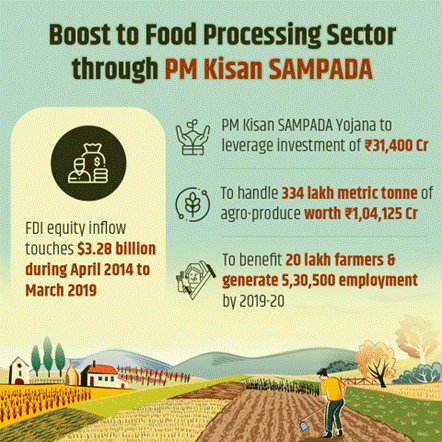
Beneficiaries
- Farmers, including small and marginal farmers engaged in agriculture and allied sectors (such as horticulture, fisheries, and animal husbandry).
- Farmer Producer Organizations (FPOs) and Self-Help Groups (SHGs) that facilitate collective action in farming.
- Agro-based industries and food processing units looking to modernize or expand their infrastructure.
- Entrepreneurs and cooperatives involved in food processing and preservation activities.
Eligibility Criteria
- Farmers and Farmer Producer Organizations (FPOs) engaged in agriculture or allied activities.
- Food processing units and agro-based industries looking to set up or expand facilities for food processing, preservation, and packaging.
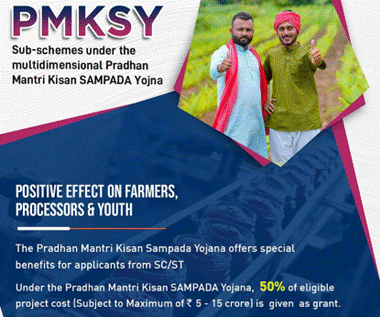
- Entrepreneurs and cooperatives operating in the agricultural and food processing sectors.
Benefits
- Modern Infrastructure: The creation of Mega Food Parks, cold chains, and warehouses helps streamline the food supply chain, reducing wastage and improving the efficiency of food processing.
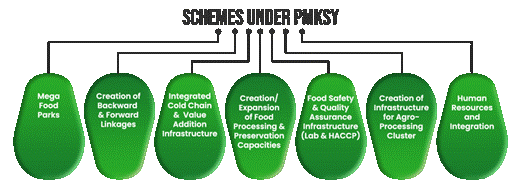
- Increased Processing Capacity: The scheme has led to a 12% increase in food processing and has helped reduce post-harvest losses, enabling farmers to get better value for their produce.
- Employment Generation: The PMKSY has helped create over 2 million jobs in the food processing sector, contributing to rural employment and income generation.
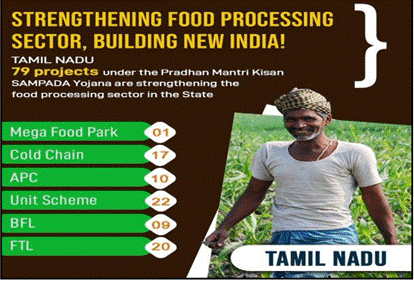
- Exports Promotion: The scheme has boosted food exports by 15%, enhancing India's presence in the global food market and increasing foreign exchange earnings.
- Reduced Post-Harvest Losses: By promoting cold chains and efficient storage systems, the scheme has helped reduce post-harvest losses by 5%, ensuring more produce reaches the market.
- Improved Food Quality and Safety: The scheme encourages adherence to international food safety and quality standards, making Indian food products more competitive globally.
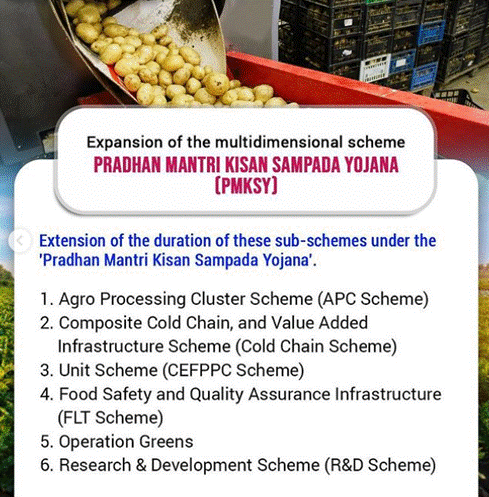
Additional Information
Key Components of PMKSY:
- Mega Food Parks: The creation of Mega Food Parks provides modern infrastructure and promotes value addition, creating efficient supply chains from farm to market.
- As of now, 41 Mega Food Parks have been approved under the scheme.
- Integrated Cold Chain and Value Addition Infrastructure: This component aims to reduce post-harvest losses, particularly for horticulture and non-horticulture produce, by providing cold storage and value addition infrastructure.
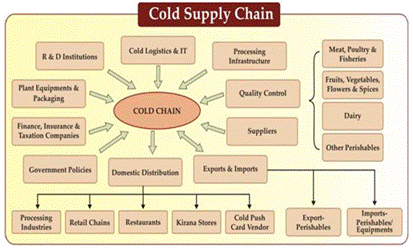
- Food Processing/Preservation Capacity Creation: This initiative provides financial assistance to increase processing capacity and reduce wastage, focusing on the creation and expansion of processing units.
- Infrastructure for Agro-Processing Clusters: This initiative helps set up infrastructure for food processing in agro-production areas to provide backward and forward linkages between producers, processors, and markets.
- Backward and Forward Linkages: This component connects groups of farmers and producers with processors and markets, creating a seamless supply chain that improves market access and reduces wastage.
- Food Safety and Quality Assurance Infrastructure: This component focuses on creating systems for monitoring food safety, ensuring compliance with domestic and international standards.
- Human Resources and Institutions: The scheme promotes research and development (R&D) activities, skill development, and standardization efforts to improve packaging, processing technologies, and value addition in food processing.
Implementation
- Coordination: The implementation of PMKSY requires coordination between central and state agencies, industry players, and farmers.
- Financial Assistance: The scheme provides subsidies to eligible entities engaged in food processing.
- Capacity Building: Training programs for farmers, entrepreneurs, and workers in the food processing industry are a key part of the implementation process.
- Monitoring: Continuous monitoring and evaluation are essential to ensure the proper utilization of funds and to track progress.
- As part of its efforts, the Government of India has approved nearly 42 Mega Food Parks and over 236 Integrated Cold Chain Projects to improve infrastructure for food processing.
- The initiative has also facilitated 100% FDI (Foreign Direct Investment) in the e-commerce of food products made in India.
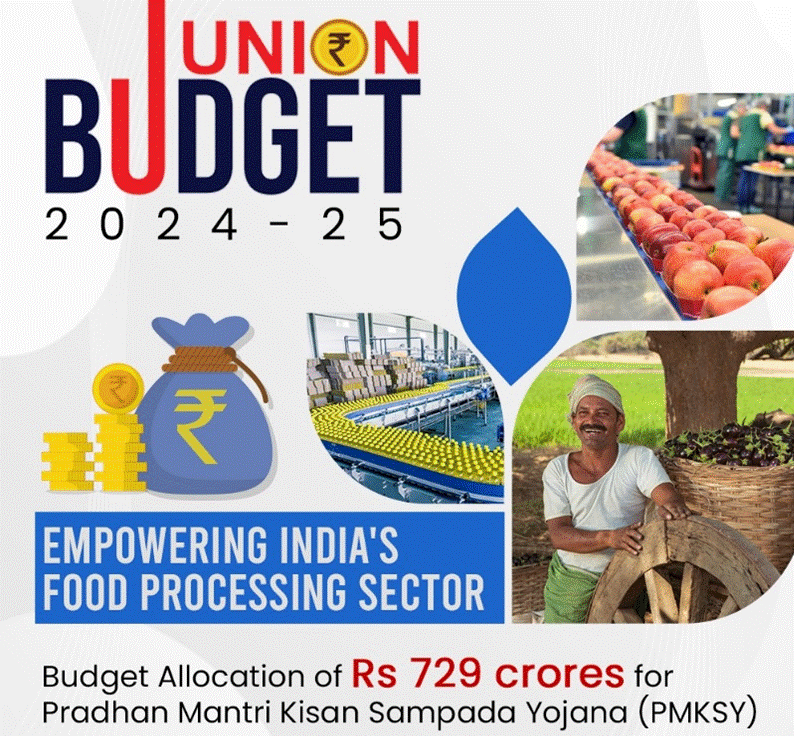
Challenges
- Coordination: Effective implementation requires collaboration among multiple stakeholders, including central and state governments, private enterprises, and farmer organizations.
- Financial Resources: Adequate funding is crucial for the success of the scheme. Attracting sufficient investments and securing budget allocations can be challenging.
- Capacity Building: Skill development in rural areas is essential to ensure that farmers, entrepreneurs, and workers can fully benefit from the scheme.
-------------------------------------
Leave a Reply
Your Comment is awaiting moderation.


